Building a solid foundation for agricultural development in South Sudan: After a decade of efforts, the Comprehensive Agriculture Master Plan is now ready for implementation
2022.04.15
South Sudan is the world’s youngest country after becoming independent from Sudan in July 2011. Beginning from the year after the country was founded, JICA has continued to provide comprehensive assistance in the agricultural sector. Now, after ten years, South Sudan is on the verge of taking a new step forward to improve the “food and livelihoods” of the people in the country, overcoming a number of turmoil and hardships, including armed conflicts and natural disasters.
The implementation of the long-term agricultural development master plan for South Sudan, on which more than 30 JICA experts have been engaged, is finally underway. The development of agriculture in South Sudan has tremendous potential to become the core industry to replace oil and is expected to lead to the country’s future and peace.
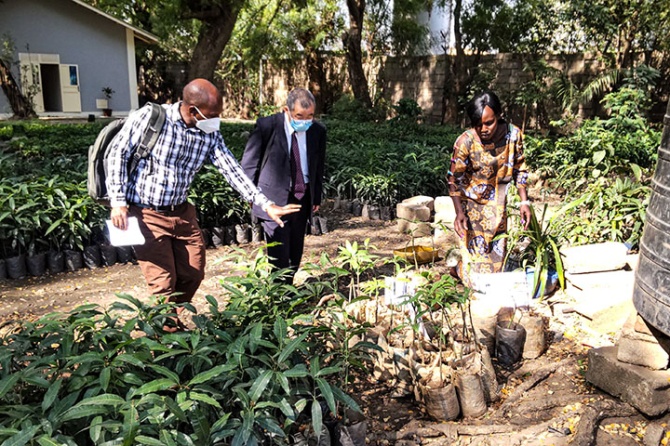
A nursery facility in Central Equatoria State that was renovated through the project. Many years of cooperation activities in the agricultural sector are entering a new phase. (January 2022, South Sudan)
Located in the Upper Nile basin in East Africa, South Sudan, with its rich natural environment, covers an area approximately 1.7 times that of Japan. The majority of the more than 60 ethnic groups are mainly engaged in subsistence farming, cattle raising, and fisheries, based on the climate and ecological conditions of their respective lands. However, the population continues to face chronic food insecurity caused by a combination of recent natural disasters in addition to people leaving farming, domestic and international migration, and disruption of social and economic services due to the effects of the civil war before the country’s independence.
Under these circumstances, in an effort to raise the level of the agricultural sector as a whole and make it a key industry that drives the economy of South Sudan, JICA has initiated the “Comprehensive Agricultural Development Master Plan (CAMP) Implementation Support Project,” which addresses issues across five subsectors: Crops, Forestry, Livestock, Fisheries, and Institutional development.
“When the project was launched in 2012, it was like starting from scratch. The relevant government officials and department staff were an assemblage of people from various backgrounds. Each individual was competent, but we were not able to take advantage of their performance as an organization. We worked patiently while respecting the government's counterparts. Although the project was in the agricultural sector, I was involved in every aspect of the entire process, from the establishment of laws by the central government to technical guidance on nursery production activities. It was truly a project in which we worked alongside the people of South Sudan, and there were many occasions where we learned from them and were impressed.”
JICA expert SERIZAWA Toshifumi, who was involved as a team leader in the formulation of CAMP and capacity development for its implementation, heartily reflects on the 10-year journey to this point.
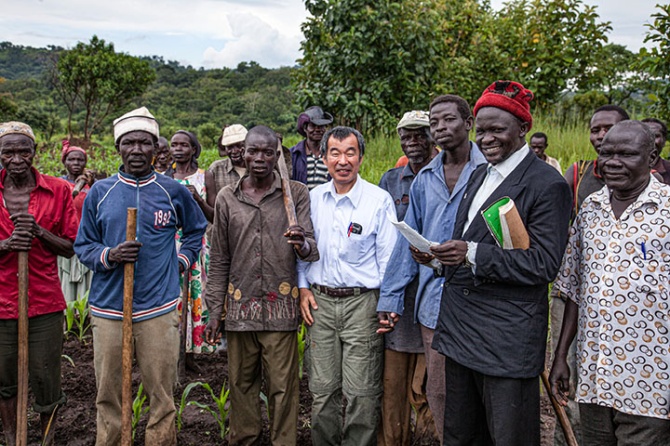
Dr. Serizawa (center photo) and others surveying an agricultural village at the beginning of the project. (September 2012, in the suburbs of Yei, Central Equatoria)
In the project, the long-term comprehensive agricultural development for the period 2015-2040 and the formulation of the Irrigation Development Master Plan (IDMP), which is important for agricultural promotion, proceeded simultaneously. South Sudan did not have a clear and coherent basic policy in either area.
“Generally, master plans become obsolete after only a few years, but CAMP takes a long-term perspective and allows for the master plan to be upgraded to the optimum plan as needed, even when policies, budgets, personnel, weather, or other conditions significantly change. The master plan is a benchmark for South Sudan's agricultural ministries and agencies to take the initiative in formulating a systematic strategy. This is so that in the future, the goals and roadmap can be set by the government based on this master plan even for projects that are pursued by cooperating organizations and NGOs other than Japan,” said Dr. Serizawa, describing the significance and results of this government-ownership-oriented approach.
Although South Sudan gained independence with the support of a referendum of more than 98%, major armed conflicts between the government and rebel groups broke out in the capital, Juba, in 2013 and 2016. The conflicts, unfortunately, resulted in numerous casualties.
Following these conflicts, JICA staff and experts were evacuated to neighboring countries and continued to work remotely. At that time, the project had already completed almost all the field surveys, such as a survey of agricultural production and markets in each region and interviews with farmers. It had transitioned to a phase where activities could be carried out through remote assistance, including analysis of collected data and planning. The project did not come to a complete halt.
“Although there was a three-month delay from the initial plan due to the impact of the COVID-19 pandemic from 2020, we are now making steady progress on the capacity development project of the South Sudanese officials to implement the CAMP/IDMP. This project started in 2017 and we have finally reached the point where we can take a new step forward,” said JICA expert HANDA Shigenobu with relief. He was in charge mainly of governance as deputy team leader.
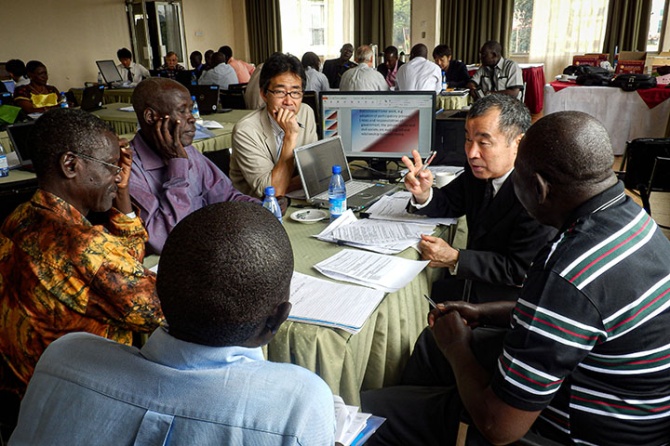
Due to the worsening security situation, discussions on the contents of the CAMP (Comprehensive Agricultural Development Master Plan) were held in the neighboring country of Uganda. (Uganda, July 2014)
Comprehensive agricultural sector assistance to South Sudan finally entered the implementation phase in March 2022, when the "Project for Revitalization and Promotion of Agriculture for Food Security and Livelihoods Improvement" began.
Based on two master plans of CAMP and IDMP, this is a suburban agriculture pilot project, in which JICA will work with farmers in the suburbs and vicinity of Juba aiming to achieve “agriculture for the future.” This includes food security and value-added crop cultivation, conducted in collaboration not only with the national government agencies in charge but also with local government officials in states and counties.
Specifically, in addition to cultivating vegetables such as tomatoes, eggplants, and peppers, JICA will also take on the challenges of poultry farming, freshwater fish farming, and mushroom cultivation, which is still uncommon locally. The aim is to select crops and varieties suited to the site, develop technologies, and determine the potential for food value chain development.

Vegetables sold at a market in the capital of Juba (left), a chicken farm (middle), and an aquaculture pond (right) of a farming group in Juba. The new project will begin its efforts in a pilot project for suburban agriculture. (September 2021)
Mr. Handa stated hesitantly, “There was a lot of arguing and discussion. In the beginning, I think we were all filled with passion for the building of a new country. However, the security and the economy in the country had deteriorated, and there was a situation where ordinary government officials were unable to make a living and were less motivated to perform their duties as civil servants. This led to a standstill in activities, and there were occasions when initiatives and discussions to improve the situation did not receive their sufficient attention. However, even under such circumstances, JICA was the only organization that continued to provide direct support to the government through its projects over the years. It took a long time, but I believe that the persistence and meticulous support of the Japanese side helped to nurture trust where we could talk about issues openly. When our counterpart, with whom we had confrontations before, asked us, ‘You will work with us on the next project as well, right?’ I have to confess that it was a very moving moment for us.”
“There are still many issues to be addressed, such as how to secure and train agricultural extension workers, for example,” Dr. Serizawa went on to say.
“The food situation in South Sudan has continued to deteriorate in recent years due to drought, flooding, and damage from desert locusts, not to mention COVID-19. Amid these circumstances, since the signing of the Revitalized Agreement on the Resolution of the Conflict (R-ARCSS) in 2018, it is said that security has stabilized and many people, including returnees from home and abroad, are coming back to the agriculture sector. We trust that JICA’s medium- to long-term support in cooperation with U.N. agencies and private NGOs will create a synergistic effect among each party, and agriculture will eventually become a key industry, leading to stable peace and development of the country. We are now determined to remain attentive to each and every farmer as much as possible and continue our activities from the same perspective.”
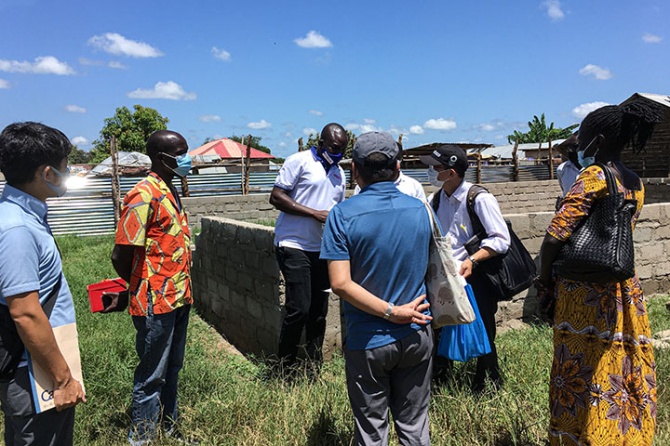
Field surveys are underway in preparation for the full implementation of the master plan such as NGO activities in the aquaculture sector. (September 2021)
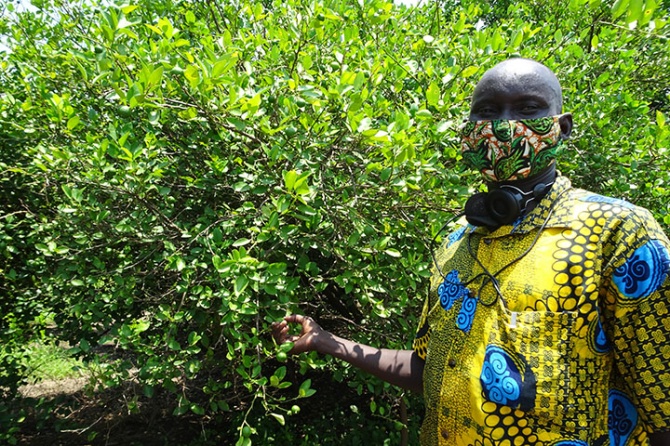
Securing agriculture extension agents is one of the major challenges and goals for the future. (September 2021)
scroll